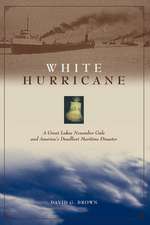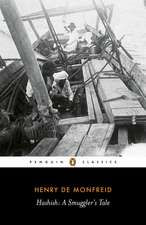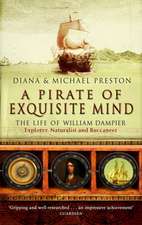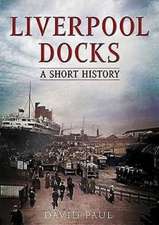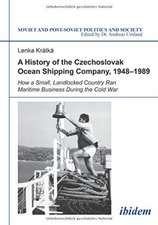Poseidon's Curse: British Naval Impressment and Atlantic Origins of the American Revolution
Autor Christopher P. Magraen Limba Engleză Paperback – 20 feb 2019
| Toate formatele și edițiile | Preț | Express |
|---|---|---|
| Paperback (1) | 290.38 lei 6-8 săpt. | |
| Cambridge University Press – 20 feb 2019 | 290.38 lei 6-8 săpt. | |
| Hardback (1) | 407.69 lei 6-8 săpt. | |
| Cambridge University Press – 13 oct 2016 | 407.69 lei 6-8 săpt. |
Preț: 290.38 lei
Nou
Puncte Express: 436
Preț estimativ în valută:
55.57€ • 57.80$ • 45.88£
55.57€ • 57.80$ • 45.88£
Carte tipărită la comandă
Livrare economică 14-28 aprilie
Preluare comenzi: 021 569.72.76
Specificații
ISBN-13: 9781107531055
ISBN-10: 1107531055
Pagini: 349
Dimensiuni: 150 x 228 x 21 mm
Greutate: 0.51 kg
Editura: Cambridge University Press
Colecția Cambridge University Press
Locul publicării:New York, United States
ISBN-10: 1107531055
Pagini: 349
Dimensiuni: 150 x 228 x 21 mm
Greutate: 0.51 kg
Editura: Cambridge University Press
Colecția Cambridge University Press
Locul publicării:New York, United States
Cuprins
Acknowledgements; Introduction; 1. Seapower and commerce: an Atlantic minuet; 2. British naval impressment in the Atlantic world; 3. Profits; 4. Property; 5. Liberty; 6. Earnings; 7. Employment; 8. Liberty; 9. A spirit of rebellion; 10. Rebellious acts; Conclusion.
Recenzii
'In Poseidon's Curse Christopher P. Magra shows how the waterfront struggle against body-snatching profoundly shaped the course of history. Once again he illuminates the Atlantic and maritime origins of the American Revolution.' Marcus Rediker, author of Outlaws of the Atlantic: Sailors, Pirates, and Motley Crews in the Age of Sail
'Liberty, as Georgian Britons never tired of boasting, was what set Britain's seaborne empire apart. As Christopher P. Magra reminds us, such braggadocio obscured a more complex and sordid reality, one where the rights of Englishmen included the right to enslave others, where British jack tars dreaded George III's press gangs almost as much as the cutters of France and Spain, and where thirteen of Britain's North American colonies eventually spoke truth to power and said 'enough'. Offering a fresh account of the American Revolution's origins, Poseidon's Curse is maritime history at its best.' Eliga Gould, University of New Hampshire and author of Among the Powers of the Earth: The American Revolution and the Making of a New World Empire
'British press gangs occasionally menaced the North American coastline by seizing men and ships for the Royal Navy, which led to dramatic acts of violence and widespread resentment and became one of the grievances listed in the US Declaration of Independence. Christopher P. Magra brings a fresh and welcome perspective to the political and economic origins of the American Revolution, drawing upon his wide-ranging knowledge of the eighteenth-century Atlantic and his acute sensitivity to the many sides of this story.' Benjamin L. Carp, City University of New York
'Impressment, the coersion of men into naval service - whether by a man-of-war stopping a merchantman at sea or a press-gang capturing men ashore - is an issue most often associated with the War of 1812. In Poseidon's Curse, however, Magra makes a compelling case that 'the press', as the abduction of mariners was colloquially known, played a pivotal role in justifying the movement for American independence. In arguing as much, Magra is swimming against the historiographical current to some extent.' Brian Rouleau, Journal of Interdisciplinary History
'Christopher P. Magra paints a vivid picture of the ways in which the impressment of men and property by the Royal Navy caused resentment in the eighteenth century British Atlantic world. … Magra reveals the harm - economic and personal - caused by a system of recruitment usually examined through the lens of the Royal Navy's manning problem. His book should therefore interest and enlighten anyone who studies maritime history.' Stephen Conway, International Journal of Maritime History
'Magra's study is distinguished by the attention given to merchants and to impressment's effect on their commerce. Most studies of impressment focus on the conflicting interests of the British Admiralty and the sailors, with mercantile interests presented primarily as competitors with the former for the labor of the latter. Few provide anything like the detailed examination of merchants' commercial relationships that Magra supplies. Merchants' economic experiences are reconstructed in powerful and engaging detail in Poseidon's Curse.' Timothy Jenks, The American Historical Review
'Liberty, as Georgian Britons never tired of boasting, was what set Britain's seaborne empire apart. As Christopher P. Magra reminds us, such braggadocio obscured a more complex and sordid reality, one where the rights of Englishmen included the right to enslave others, where British jack tars dreaded George III's press gangs almost as much as the cutters of France and Spain, and where thirteen of Britain's North American colonies eventually spoke truth to power and said 'enough'. Offering a fresh account of the American Revolution's origins, Poseidon's Curse is maritime history at its best.' Eliga Gould, University of New Hampshire and author of Among the Powers of the Earth: The American Revolution and the Making of a New World Empire
'British press gangs occasionally menaced the North American coastline by seizing men and ships for the Royal Navy, which led to dramatic acts of violence and widespread resentment and became one of the grievances listed in the US Declaration of Independence. Christopher P. Magra brings a fresh and welcome perspective to the political and economic origins of the American Revolution, drawing upon his wide-ranging knowledge of the eighteenth-century Atlantic and his acute sensitivity to the many sides of this story.' Benjamin L. Carp, City University of New York
'Impressment, the coersion of men into naval service - whether by a man-of-war stopping a merchantman at sea or a press-gang capturing men ashore - is an issue most often associated with the War of 1812. In Poseidon's Curse, however, Magra makes a compelling case that 'the press', as the abduction of mariners was colloquially known, played a pivotal role in justifying the movement for American independence. In arguing as much, Magra is swimming against the historiographical current to some extent.' Brian Rouleau, Journal of Interdisciplinary History
'Christopher P. Magra paints a vivid picture of the ways in which the impressment of men and property by the Royal Navy caused resentment in the eighteenth century British Atlantic world. … Magra reveals the harm - economic and personal - caused by a system of recruitment usually examined through the lens of the Royal Navy's manning problem. His book should therefore interest and enlighten anyone who studies maritime history.' Stephen Conway, International Journal of Maritime History
'Magra's study is distinguished by the attention given to merchants and to impressment's effect on their commerce. Most studies of impressment focus on the conflicting interests of the British Admiralty and the sailors, with mercantile interests presented primarily as competitors with the former for the labor of the latter. Few provide anything like the detailed examination of merchants' commercial relationships that Magra supplies. Merchants' economic experiences are reconstructed in powerful and engaging detail in Poseidon's Curse.' Timothy Jenks, The American Historical Review
Notă biografică
Descriere
An investigation of the Atlantic origins of the American Revolution, focusing on the British navy's impressment of American ships and mariners.

